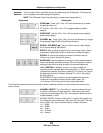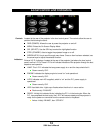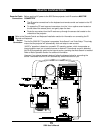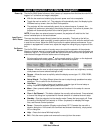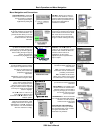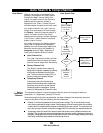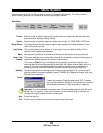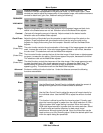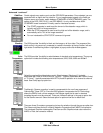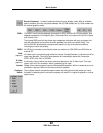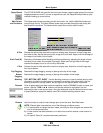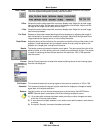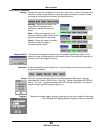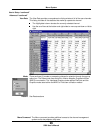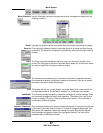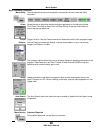
Menu System
21
5200 User’s Manual
Advanced “continued”
Odd/Even
Certain signals may require you to set the ODD/EVEN parameters. Once selected, you are
presented with an option box for selection. If your image appears jagged or the fields are
offset or seem out of order, switch between STANDARD or NON-STANDARD mode. The
setting of the ODD, ODD PLUS 1 and ODD MINUS 1 is only available when NON-
STANDARD mode is selected. Primarily used for interlaced sources.
The START parameter is used to set the low end of the detection range, which is
typically set to 25% of image resolution.
While the STOP parameter is used to set the high end of the detection range, and is
automatically set to 75% of the image resolution.
For non-interlaced the START/STOP command is ignored
Blanking
The 5200 provides’ the ability to blank out the image on all four sides. The purpose of the
blank control is to remove any unwanted or useless information at the top, bottom, left and
right sides. Once Blanking button is highlighted, a pop-up active list window appears.
Color
Temperature
The 5200 provides’ the ability to select between 4 standard color temperatures. The pop-up
option box includes the following color temperatures; 3200, 5600, 6500 and 9200 K.
Clamp
Select the required black level clamp point. Select between “Back porch” (typically
associated with Video or RGB 3-wire) or “Sync tip” ” (typically associated with RGB 4/5-wire)
or “Tri-Level” ” (typically associated with HDTV) mode of operation on a channel-to-channel
basis. See Clamp pop-up option box.
Gamma
Traditionally, Gamma correction is used to compensate for the non-linear response of
Cathode Ray Tubes (CRT’s). Since the 5200 projector incorporates the DLP technology,
where the DMD’s have a linear response, the Gamma signal that is used in standard
broadcast signals must be removed. There are 4 different settings in the pop-up option box
for the Gamma removal. Select the best option for optimum low end or black level.
Mode
There are three (3) modes or processing choices for selection through the pop-up option box.
The Video mode uses the built-in
Motion Adaptive Progressive Scan
(MAPS) conversation,
The
Interlaced Graphics
mode applies Filed Jam and the
Graphics
mode uses neither the
MAPS or Field Jam correction method.



